
LitServe
The easiest way to deploy agents, MCP servers, models, RAG, pipelines and more. No MLOps. No YAML.
Stars: 3558
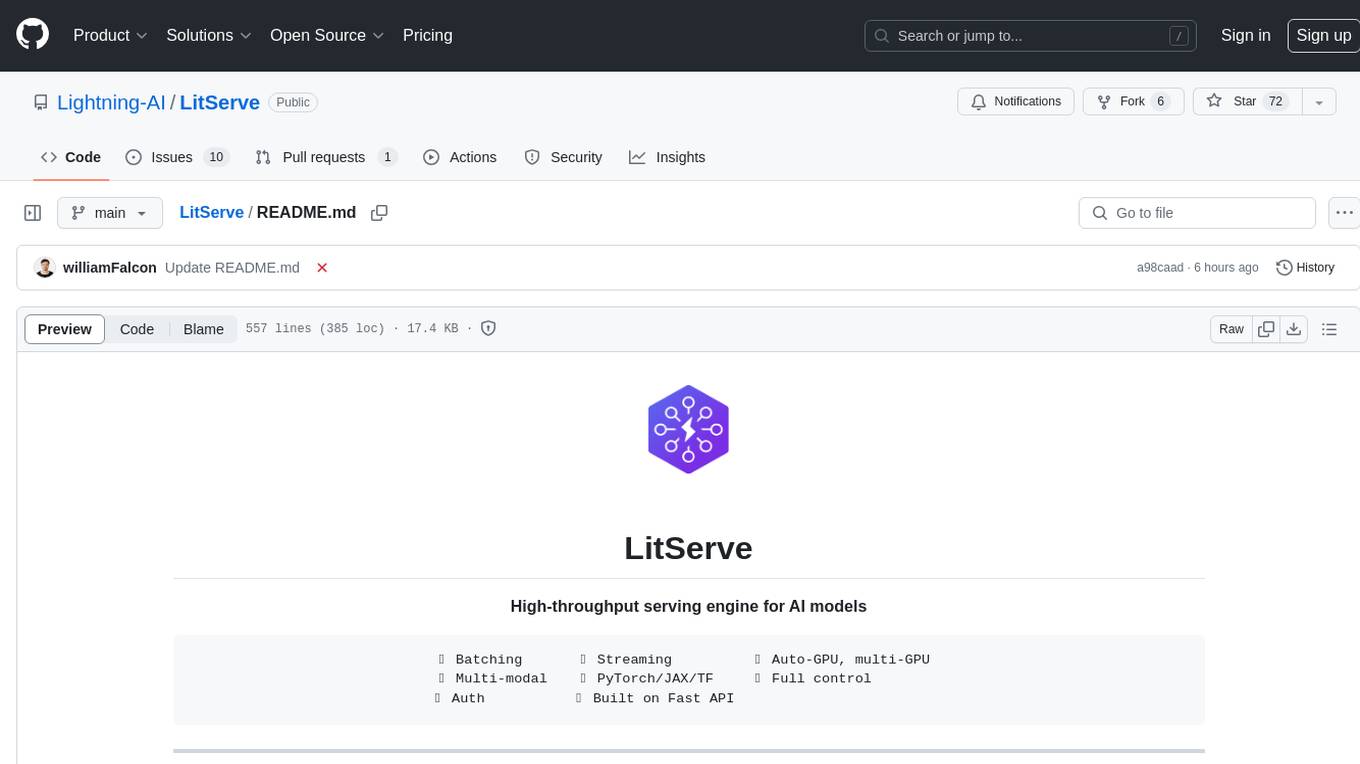
LitServe is a high-throughput serving engine designed for deploying AI models at scale. It generates an API endpoint for models, handles batching, streaming, and autoscaling across CPU/GPUs. LitServe is built for enterprise scale with a focus on minimal, hackable code-base without bloat. It supports various model types like LLMs, vision, time-series, and works with frameworks like PyTorch, JAX, Tensorflow, and more. The tool allows users to focus on model performance rather than serving boilerplate, providing full control and flexibility.
README:
Most serving engines serve one model with rigid abstractions. LitServe lets you serve any model (vision, audio, text) and build full AI systems - agents, chatbots, MCP servers, RAG, pipelines - with full control, batching, multi-GPU, streaming, custom logic, multi-model support, and zero YAML.
Self host or deploy in one-click to Lightning AI.
✅ Build full AI systems ✅ 2× faster than FastAPI ✅ Agents, RAG, pipelines, more ✅ Custom logic + control ✅ Any PyTorch model ✅ Self-host or managed ✅ Multi-GPU autoscaling ✅ Batching + streaming ✅ BYO model or vLLM ✅ No MLOps glue code ✅ Easy setup in Python ✅ Serverless support
Install LitServe via pip (more options):
pip install litserveExample 1: Toy inference pipeline with multiple models.
Example 2: Minimal agent to fetch the news (with OpenAI API).
(Advanced examples):
import litserve as ls
# define the api to include any number of models, dbs, etc...
class InferencePipeline(ls.LitAPI):
def setup(self, device):
self.model1 = lambda x: x**2
self.model2 = lambda x: x**3
def predict(self, request):
x = request["input"]
# perform calculations using both models
a = self.model1(x)
b = self.model2(x)
c = a + b
return {"output": c}
if __name__ == "__main__":
# 12+ features like batching, streaming, etc...
server = ls.LitServer(InferencePipeline(max_batch_size=1), accelerator="auto")
server.run(port=8000)Deploy for free to Lightning cloud (or self host anywhere):
# Deploy for free with autoscaling, monitoring, etc...
lightning deploy server.py --cloud
# Or run locally (self host anywhere)
lightning deploy server.py
# python server.pyTest the server: Simulate an http request (run this on any terminal):
curl -X POST http://127.0.0.1:8000/predict -H "Content-Type: application/json" -d '{"input": 4.0}'import re, requests, openai
import litserve as ls
class NewsAgent(ls.LitAPI):
def setup(self, device):
self.openai_client = openai.OpenAI(api_key="OPENAI_API_KEY")
def predict(self, request):
website_url = request.get("website_url", "https://text.npr.org/")
website_text = re.sub(r'<[^>]+>', ' ', requests.get(website_url).text)
# ask the LLM to tell you about the news
llm_response = self.openai_client.chat.completions.create(
model="gpt-3.5-turbo",
messages=[{"role": "user", "content": f"Based on this, what is the latest: {website_text}"}],
)
output = llm_response.choices[0].message.content.strip()
return {"output": output}
if __name__ == "__main__":
server = ls.LitServer(NewsAgent())
server.run(port=8000)Test it:
curl -X POST http://127.0.0.1:8000/predict -H "Content-Type: application/json" -d '{"website_url": "https://text.npr.org/"}'
A few key benefits:
- Deploy any pipeline or model: Agents, pipelines, RAG, chatbots, image models, video, speech, text, etc...
- No MLOps glue: LitAPI lets you build full AI systems (multi-model, agent, RAG) in one place (more).
-
Instant setup: Connect models, DBs, and data in a few lines with
setup()(more). - Optimized: autoscaling, GPU support, and fast inference included (more).
- Deploy anywhere: self-host or one-click deploy with Lightning (more).
- FastAPI for AI: Built on FastAPI but optimized for AI - 2× faster with AI-specific multi-worker handling (more).
- Expert-friendly: Use vLLM, or build your own with full control over batching, caching, and logic (more).
⚠️ Not a vLLM or Ollama alternative out of the box. LitServe gives you lower-level flexibility to build what they do (and more) if you need it.
Here are examples of inference pipelines for common model types and use cases.
Toy model: Hello world LLMs: Llama 3.2, LLM Proxy server, Agent with tool use RAG: vLLM RAG (Llama 3.2), RAG API (LlamaIndex) NLP: Hugging face, BERT, Text embedding API Multimodal: OpenAI Clip, MiniCPM, Phi-3.5 Vision Instruct, Qwen2-VL, Pixtral Audio: Whisper, AudioCraft, StableAudio, Noise cancellation (DeepFilterNet) Vision: Stable diffusion 2, AuraFlow, Flux, Image Super Resolution (Aura SR), Background Removal, Control Stable Diffusion (ControlNet) Speech: Text-speech (XTTS V2), Parler-TTS Classical ML: Random forest, XGBoost Miscellaneous: Media conversion API (ffmpeg), PyTorch + TensorFlow in one API, LLM proxy server
Browse 100+ community-built templates
Self-host with full control, or deploy with Lightning AI in seconds with autoscaling, security, and 99.995% uptime.
Free tier included. No setup required. Run on your cloud
lightning deploy server.py --cloudhttps://github.com/user-attachments/assets/ff83dab9-0c9f-4453-8dcb-fb9526726344
| Feature | Self Managed | Fully Managed on Lightning |
|---|---|---|
| Docker-first deployment | ✅ DIY | ✅ One-click deploy |
| Cost | ✅ Free (DIY) | ✅ Generous free tier with pay as you go |
| Full control | ✅ | ✅ |
| Use any engine (vLLM, etc.) | ✅ | ✅ vLLM, Ollama, LitServe, etc. |
| Own VPC | ✅ (manual setup) | ✅ Connect your own VPC |
| (2x)+ faster than plain FastAPI | ✅ | ✅ |
| Bring your own model | ✅ | ✅ |
| Build compound systems (1+ models) | ✅ | ✅ |
| GPU autoscaling | ✅ | ✅ |
| Batching | ✅ | ✅ |
| Streaming | ✅ | ✅ |
| Worker autoscaling | ✅ | ✅ |
| Serve all models: (LLMs, vision, etc.) | ✅ | ✅ |
| Supports PyTorch, JAX, TF, etc... | ✅ | ✅ |
| OpenAPI compliant | ✅ | ✅ |
| Open AI compatibility | ✅ | ✅ |
| MCP server support | ✅ | ✅ |
| Asynchronous | ✅ | ✅ |
| Authentication | ❌ DIY | ✅ Token, password, custom |
| GPUs | ❌ DIY | ✅ 8+ GPU types, H100s from $1.75 |
| Load balancing | ❌ | ✅ Built-in |
| Scale to zero (serverless) | ❌ | ✅ No machine runs when idle |
| Autoscale up on demand | ❌ | ✅ Auto scale up/down |
| Multi-node inference | ❌ | ✅ Distribute across nodes |
| Use AWS/GCP credits | ❌ | ✅ Use existing cloud commits |
| Versioning | ❌ | ✅ Make and roll back releases |
| Enterprise-grade uptime (99.95%) | ❌ | ✅ SLA-backed |
| SOC2 / HIPAA compliance | ❌ | ✅ Certified & secure |
| Observability | ❌ | ✅ Built-in, connect 3rd party tools |
| CI/CD ready | ❌ | ✅ Lightning SDK |
| 24/7 enterprise support | ❌ | ✅ Dedicated support |
| Cost controls & audit logs | ❌ | ✅ Budgets, breakdowns, logs |
| Debug on GPUs | ❌ | ✅ Studio integration |
| 20+ features | - | - |
LitServe is designed for AI workloads. Specialized multi-worker handling delivers a minimum 2x speedup over FastAPI.
Additional features like batching and GPU autoscaling can drive performance well beyond 2x, scaling efficiently to handle more simultaneous requests than FastAPI and TorchServe.
Reproduce the full benchmarks here (higher is better).
These results are for image and text classification ML tasks. The performance relationships hold for other ML tasks (embedding, LLM serving, audio, segmentation, object detection, summarization etc...).
💡 Note on LLM serving: For high-performance LLM serving (like Ollama/vLLM), integrate vLLM with LitServe, use LitGPT, or build your custom vLLM-like server with LitServe. Optimizations like kv-caching, which can be done with LitServe, are needed to maximize LLM performance.
LitServe is a community project accepting contributions - Let's make the world's most advanced AI inference engine.
For Tasks:
Click tags to check more tools for each tasksFor Jobs:
Alternative AI tools for LitServe
Similar Open Source Tools

LitServe
LitServe is a high-throughput serving engine designed for deploying AI models at scale. It generates an API endpoint for models, handles batching, streaming, and autoscaling across CPU/GPUs. LitServe is built for enterprise scale with a focus on minimal, hackable code-base without bloat. It supports various model types like LLMs, vision, time-series, and works with frameworks like PyTorch, JAX, Tensorflow, and more. The tool allows users to focus on model performance rather than serving boilerplate, providing full control and flexibility.
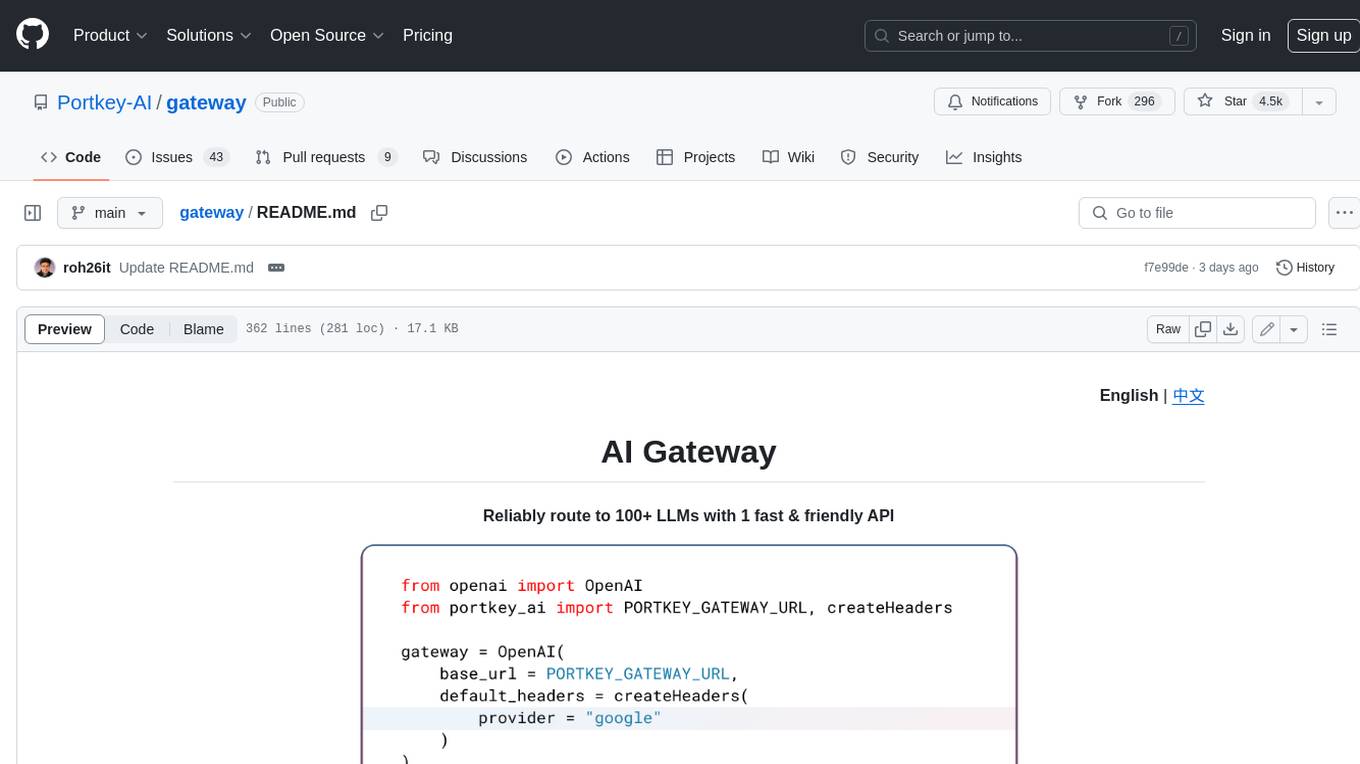
gateway
Gateway is a tool that streamlines requests to 100+ open & closed source models with a unified API. It is production-ready with support for caching, fallbacks, retries, timeouts, load balancing, and can be edge-deployed for minimum latency. It is blazing fast with a tiny footprint, supports load balancing across multiple models, providers, and keys, ensures app resilience with fallbacks, offers automatic retries with exponential fallbacks, allows configurable request timeouts, supports multimodal routing, and can be extended with plug-in middleware. It is battle-tested over 300B tokens and enterprise-ready for enhanced security, scale, and custom deployments.
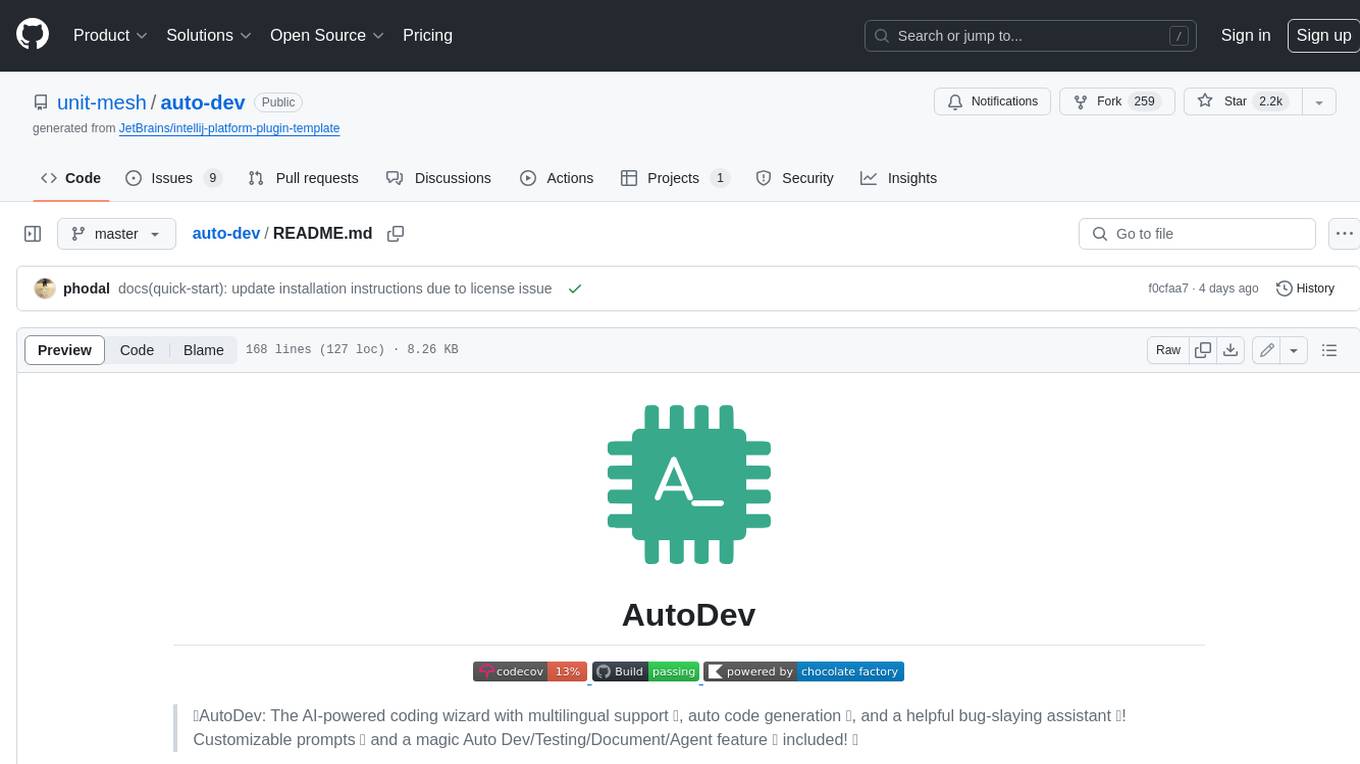
auto-dev
AutoDev is an AI-powered coding wizard that supports multiple languages, including Java, Kotlin, JavaScript/TypeScript, Rust, Python, Golang, C/C++/OC, and more. It offers a range of features, including auto development mode, copilot mode, chat with AI, customization options, SDLC support, custom AI agent integration, and language features such as language support, extensions, and a DevIns language for AI agent development. AutoDev is designed to assist developers with tasks such as auto code generation, bug detection, code explanation, exception tracing, commit message generation, code review content generation, smart refactoring, Dockerfile generation, CI/CD config file generation, and custom shell/command generation. It also provides a built-in LLM fine-tune model and supports UnitEval for LLM result evaluation and UnitGen for code-LLM fine-tune data generation.
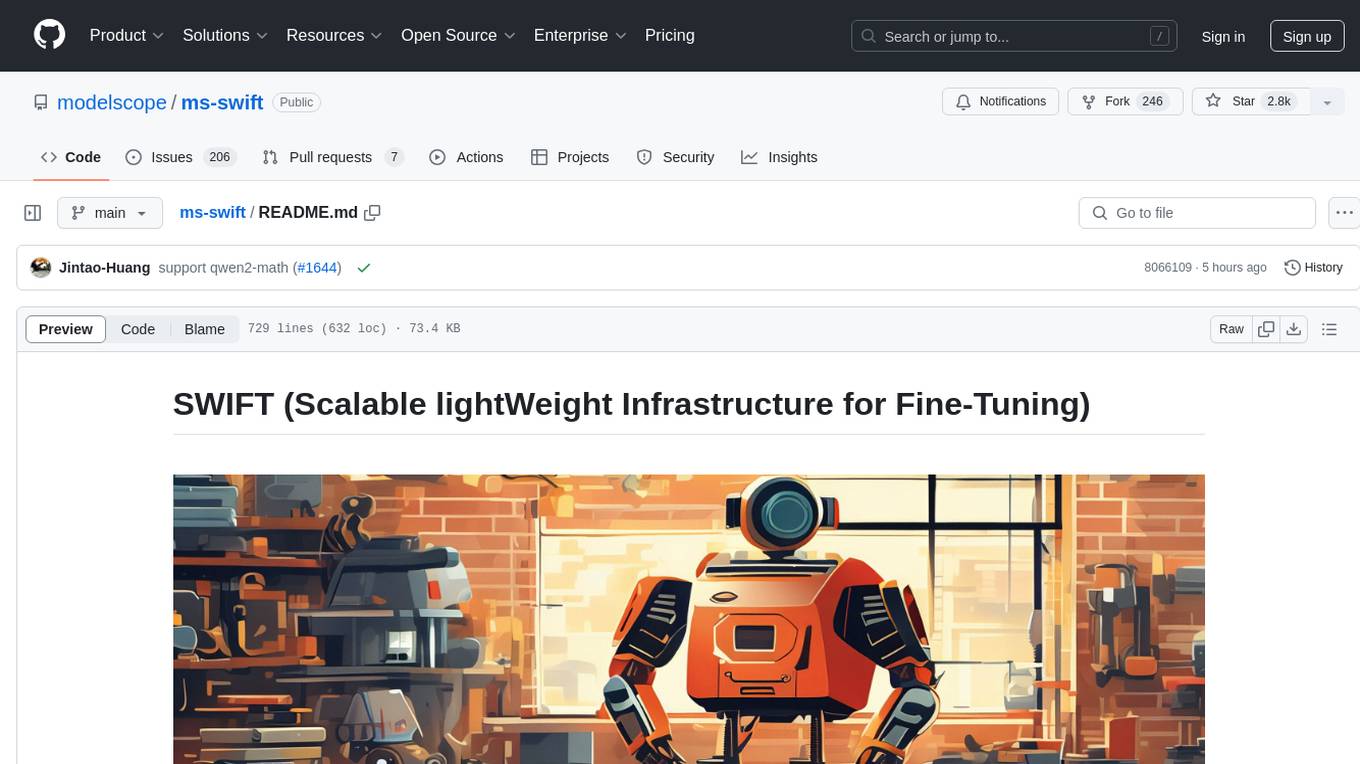
ms-swift
ms-swift is an official framework provided by the ModelScope community for fine-tuning and deploying large language models and multi-modal large models. It supports training, inference, evaluation, quantization, and deployment of over 400 large models and 100+ multi-modal large models. The framework includes various training technologies and accelerates inference, evaluation, and deployment modules. It offers a Gradio-based Web-UI interface and best practices for easy application of large models. ms-swift supports a wide range of model types, dataset types, hardware support, lightweight training methods, distributed training techniques, quantization training, RLHF training, multi-modal training, interface training, plugin and extension support, inference acceleration engines, model evaluation, and model quantization.
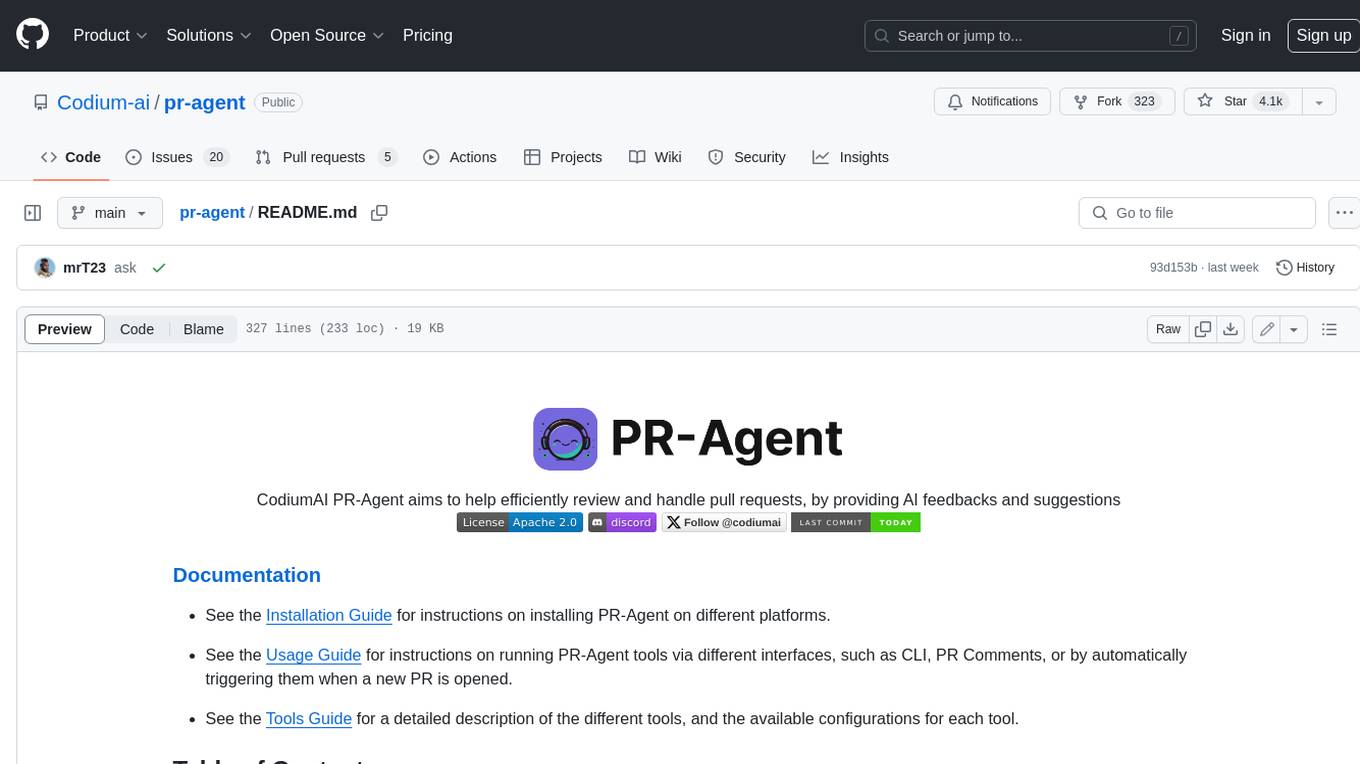
pr-agent
PR-Agent is a tool that helps to efficiently review and handle pull requests by providing AI feedbacks and suggestions. It supports various commands such as generating PR descriptions, providing code suggestions, answering questions about the PR, and updating the CHANGELOG.md file. PR-Agent can be used via CLI, GitHub Action, GitHub App, Docker, and supports multiple git providers and models. It emphasizes real-life practical usage, with each tool having a single GPT-4 call for quick and affordable responses. The PR Compression strategy enables effective handling of both short and long PRs, while the JSON prompting strategy allows for modular and customizable tools. PR-Agent Pro, the hosted version by CodiumAI, provides additional benefits such as full management, improved privacy, priority support, and extra features.
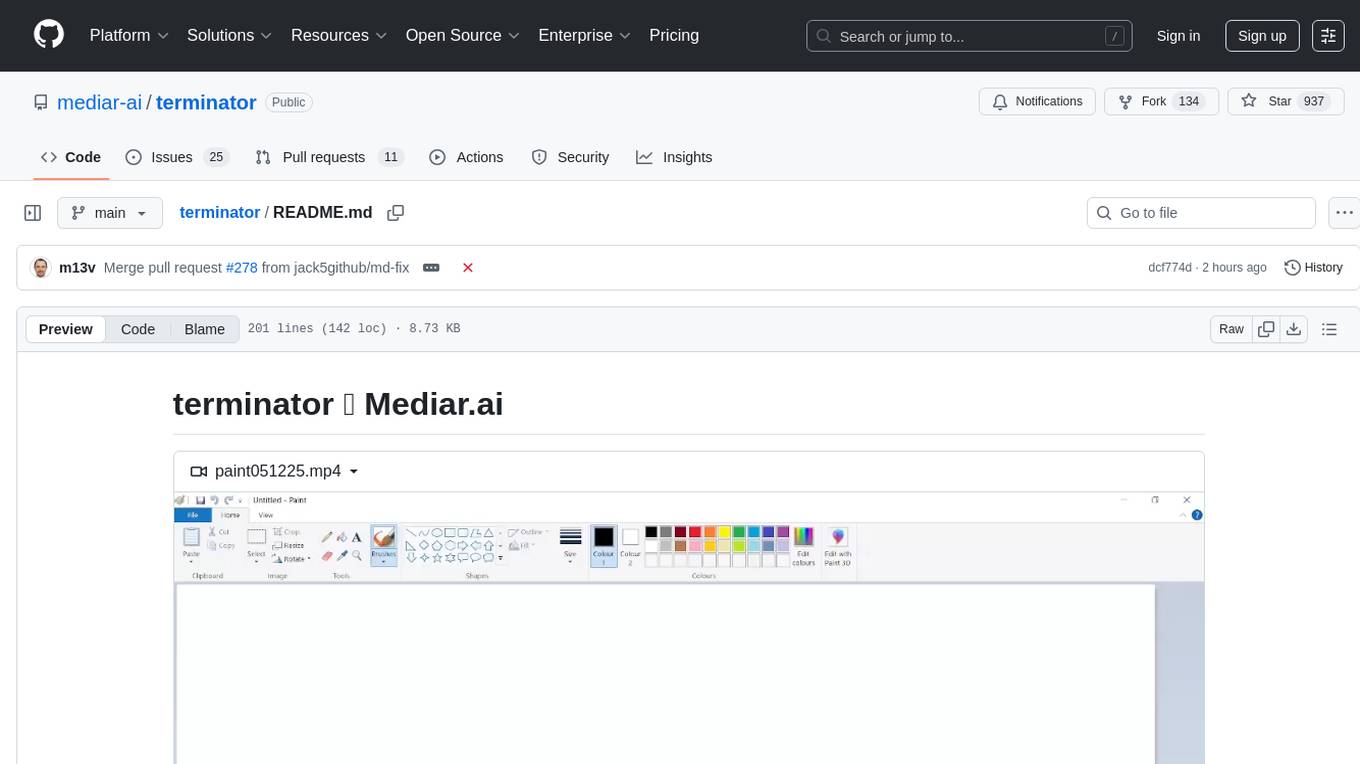
terminator
Terminator is an AI-powered desktop automation tool that is open source, MIT-licensed, and cross-platform. It works across all apps and browsers, inspired by GitHub Actions & Playwright. It is 100x faster than generic AI agents, with over 95% success rate and no vendor lock-in. Users can create automations that work across any desktop app or browser, achieve high success rates without costly consultant armies, and pre-train workflows as deterministic code.
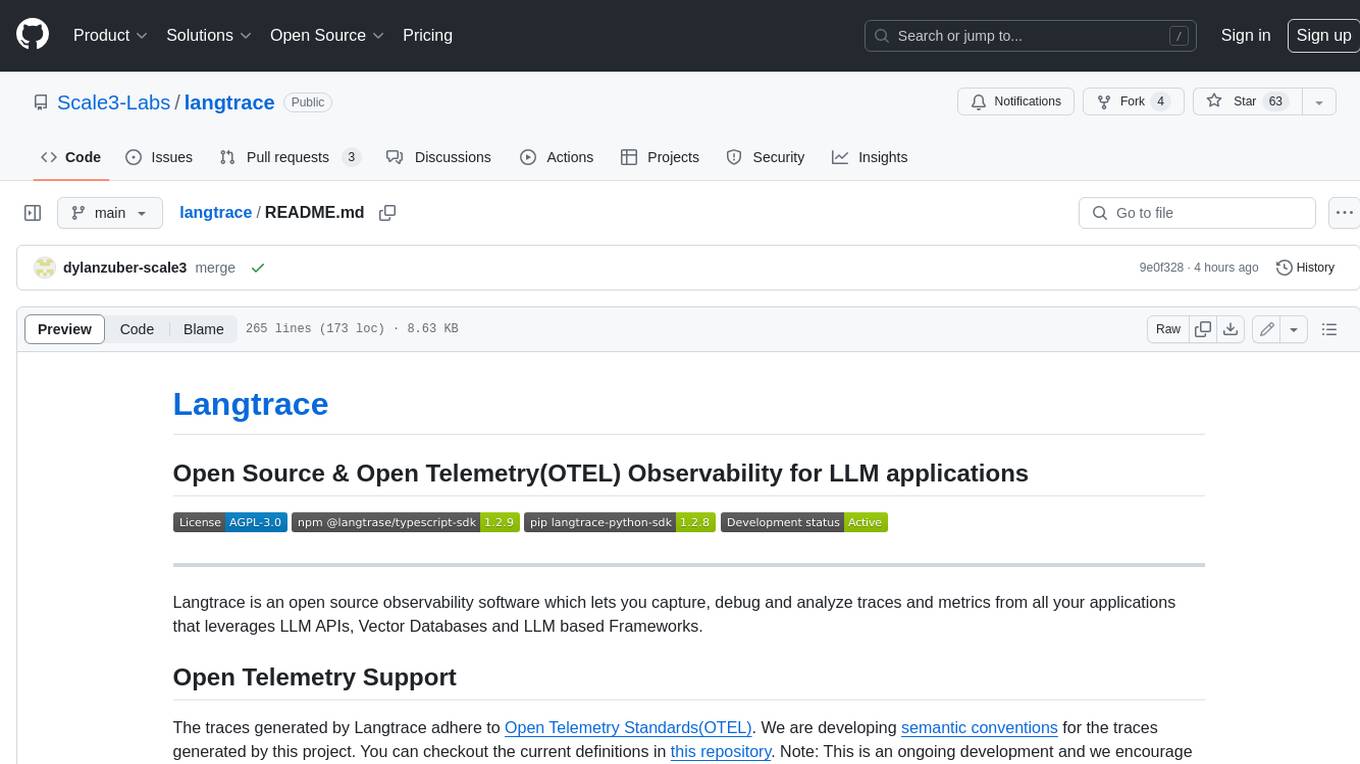
langtrace
Langtrace is an open source observability software that lets you capture, debug, and analyze traces and metrics from all your applications that leverage LLM APIs, Vector Databases, and LLM-based Frameworks. It supports Open Telemetry Standards (OTEL), and the traces generated adhere to these standards. Langtrace offers both a managed SaaS version (Langtrace Cloud) and a self-hosted option. The SDKs for both Typescript/Javascript and Python are available, making it easy to integrate Langtrace into your applications. Langtrace automatically captures traces from various vendors, including OpenAI, Anthropic, Azure OpenAI, Langchain, LlamaIndex, Pinecone, and ChromaDB.
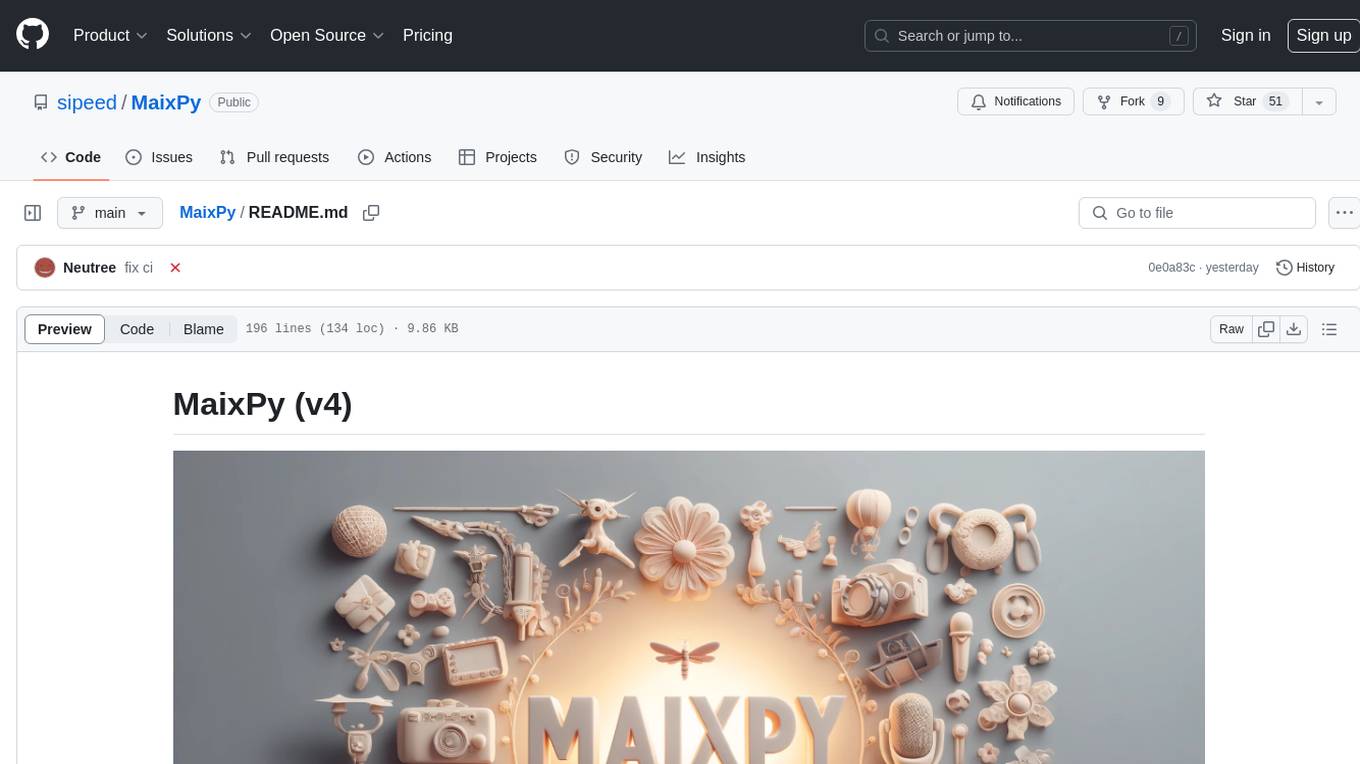
MaixPy
MaixPy is a Python SDK that enables users to easily create AI vision projects on edge devices. It provides a user-friendly API for accessing NPU, making it suitable for AI Algorithm Engineers, STEM teachers, Makers, Engineers, Students, Enterprises, and Contestants. The tool supports Python programming, MaixVision Workstation, AI vision, video streaming, voice recognition, and peripheral usage. It also offers an online AI training platform called MaixHub. MaixPy is designed for new hardware platforms like MaixCAM, offering improved performance and features compared to older versions. The ecosystem includes hardware, software, tools, documentation, and a cloud platform.
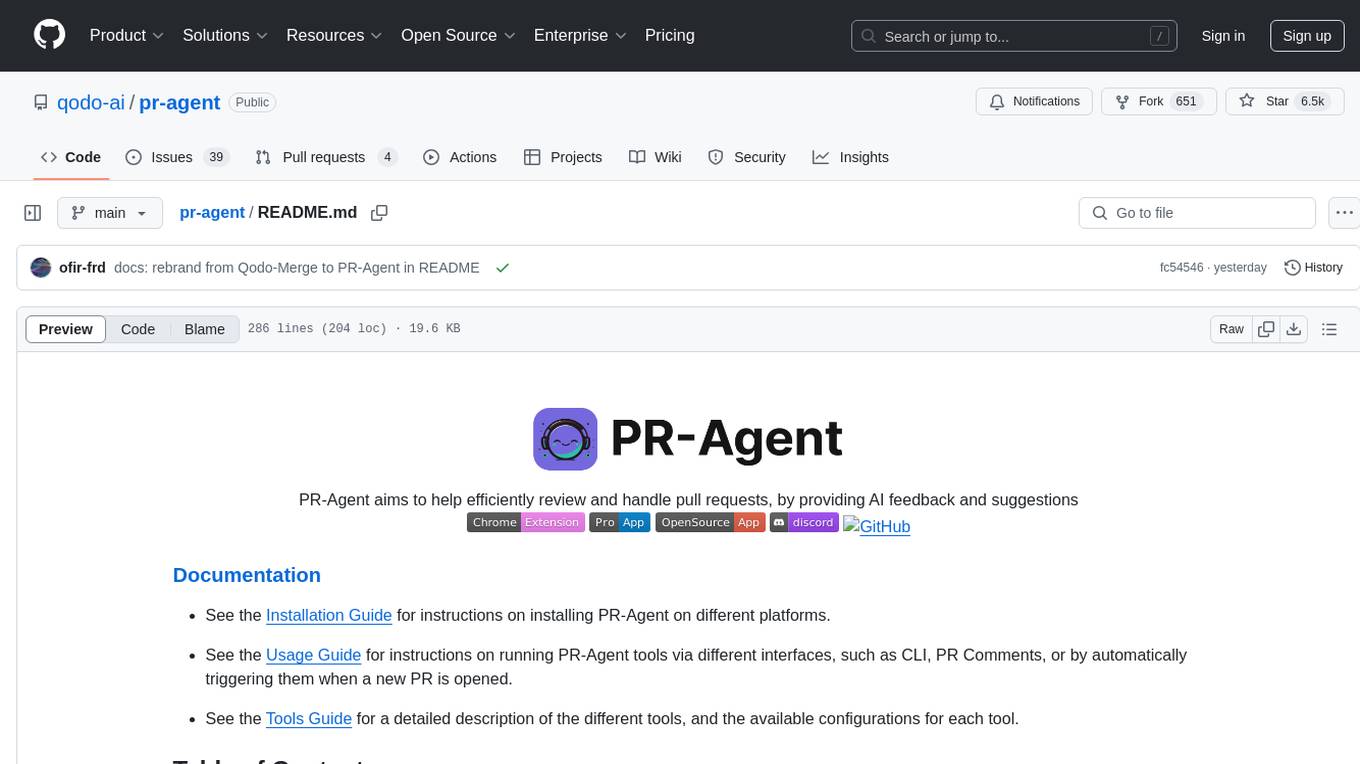
pr-agent
PR-Agent is a tool designed to assist in efficiently reviewing and handling pull requests by providing AI feedback and suggestions. It offers various tools such as Review, Describe, Improve, Ask, Update CHANGELOG, and more, with the ability to run them via different interfaces like CLI, PR Comments, or automatically triggering them when a new PR is opened. The tool supports multiple git platforms and models, emphasizing real-life practical usage and modular, customizable tools.
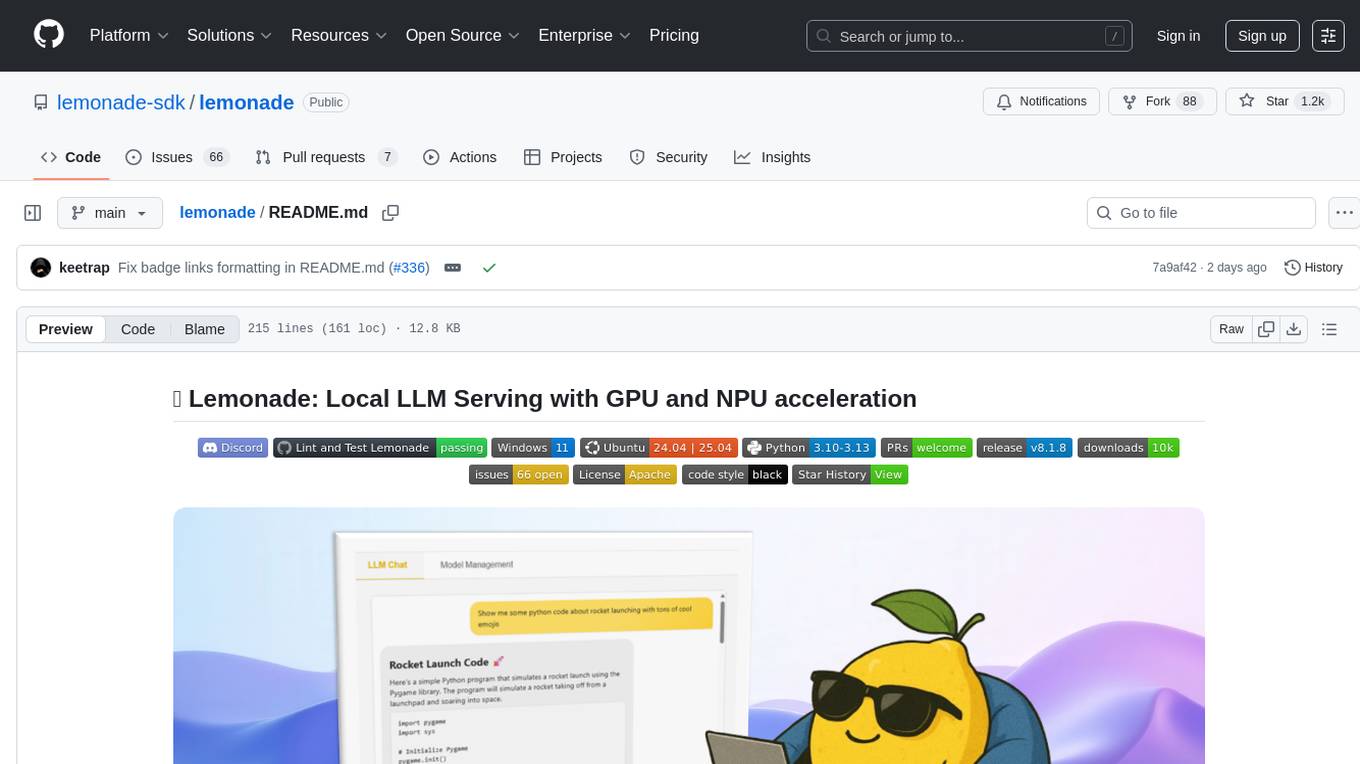
lemonade
Lemonade is a tool that helps users run local Large Language Models (LLMs) with high performance by configuring state-of-the-art inference engines for their Neural Processing Units (NPUs) and Graphics Processing Units (GPUs). It is used by startups, research teams, and large companies to run LLMs efficiently. Lemonade provides a high-level Python API for direct integration of LLMs into Python applications and a CLI for mixing and matching LLMs with various features like prompting templates, accuracy testing, performance benchmarking, and memory profiling. The tool supports both GGUF and ONNX models and allows importing custom models from Hugging Face using the Model Manager. Lemonade is designed to be easy to use and switch between different configurations at runtime, making it a versatile tool for running LLMs locally.
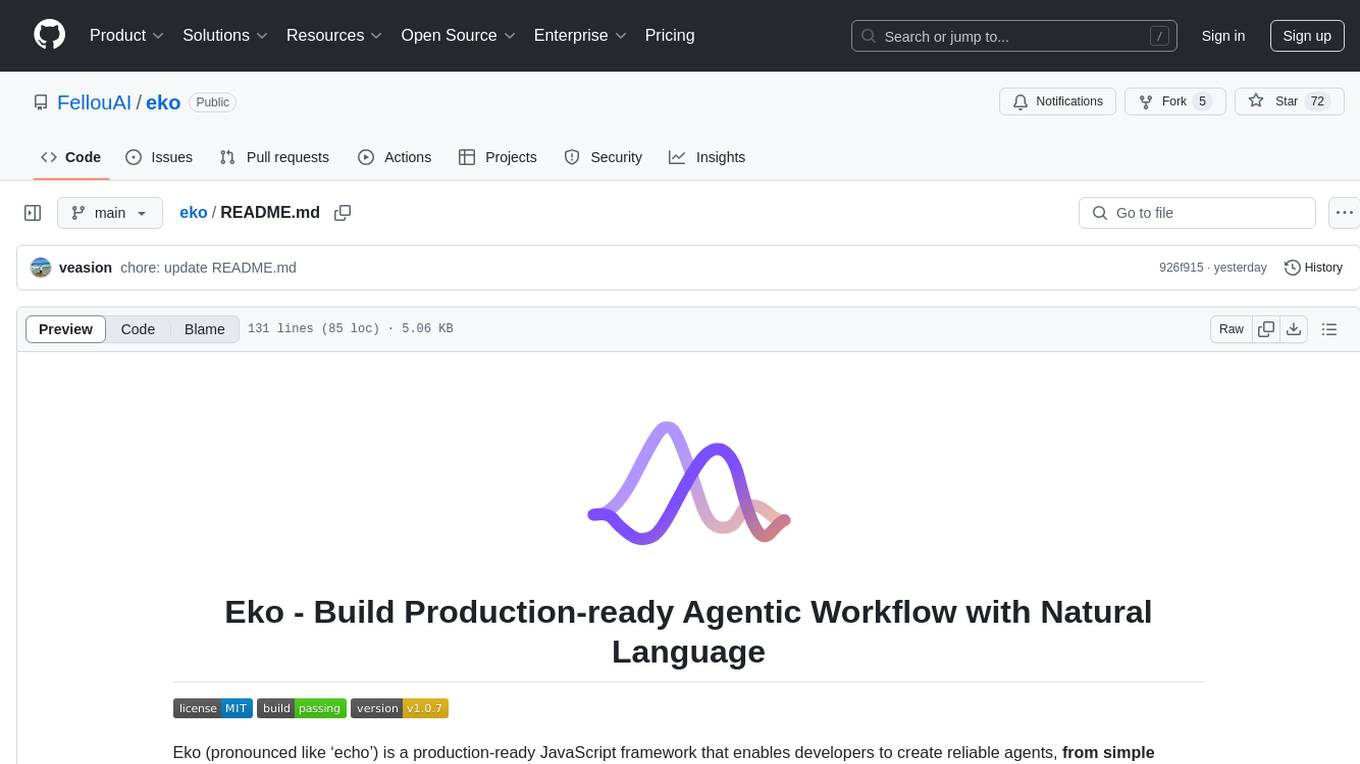
eko
Eko is a lightweight and flexible command-line tool for managing environment variables in your projects. It allows you to easily set, get, and delete environment variables for different environments, making it simple to manage configurations across development, staging, and production environments. With Eko, you can streamline your workflow and ensure consistency in your application settings without the need for complex setup or configuration files.
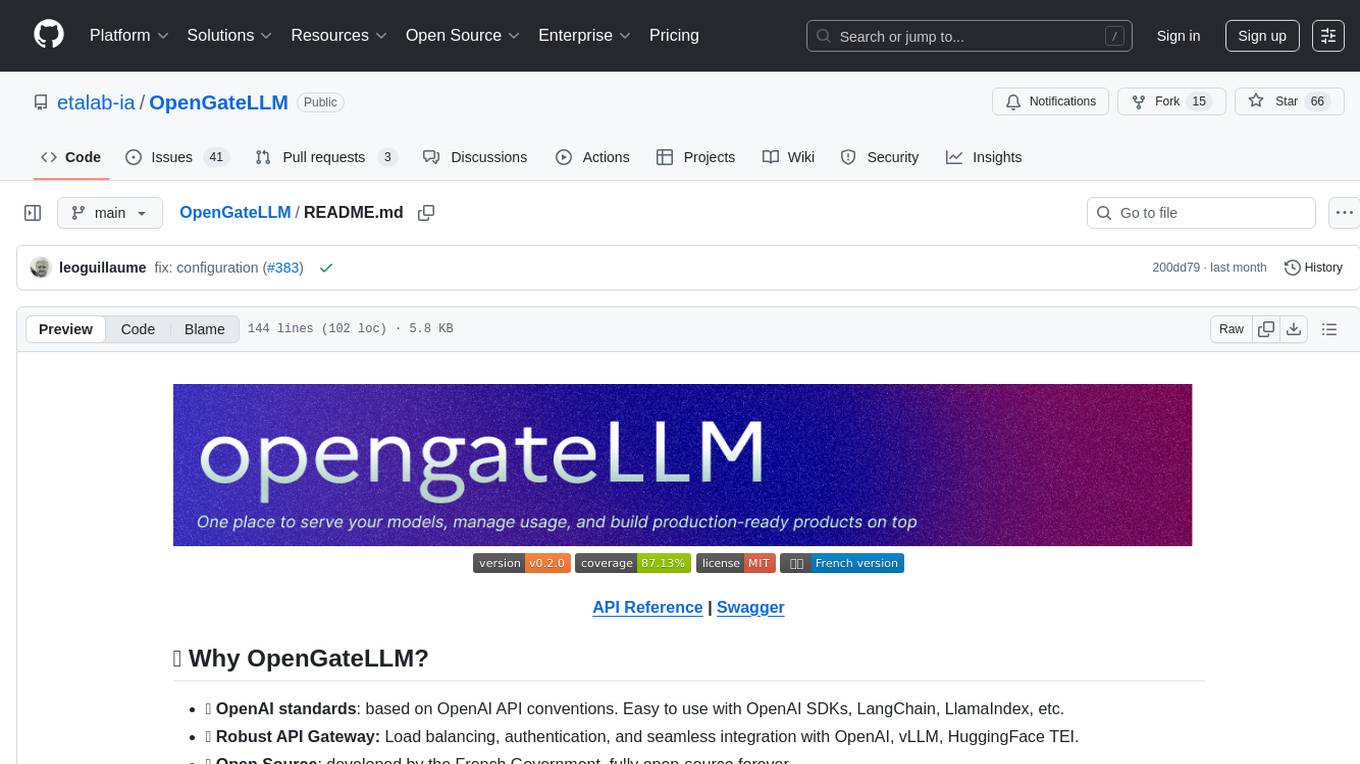
OpenGateLLM
OpenGateLLM is an open-source API gateway developed by the French Government, designed to serve AI models in production. It follows OpenAI standards and offers robust features like RAG integration, audio transcription, OCR, and more. With support for multiple AI backends and built-in security, OpenGateLLM provides a production-ready solution for various AI tasks.
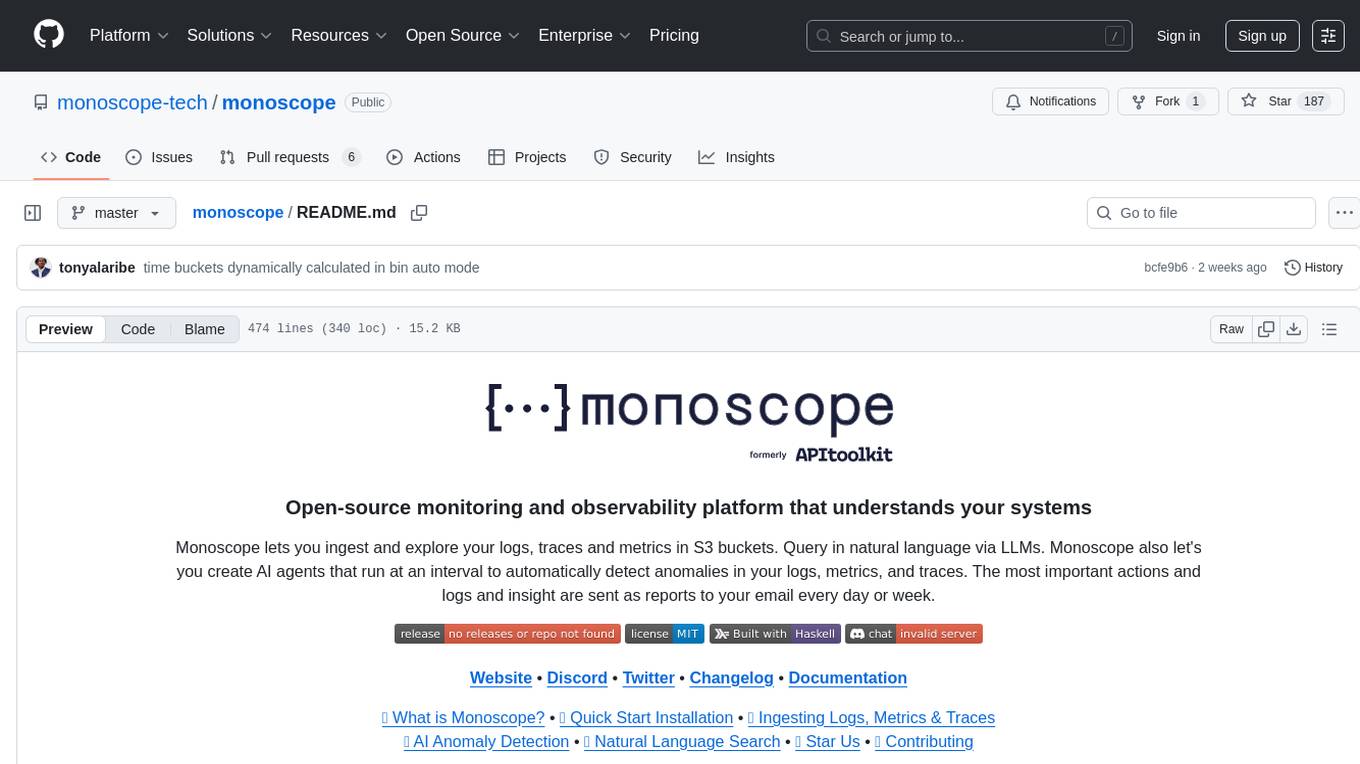
monoscope
Monoscope is an open-source monitoring and observability platform that uses artificial intelligence to understand and monitor systems automatically. It allows users to ingest and explore logs, traces, and metrics in S3 buckets, query in natural language via LLMs, and create AI agents to detect anomalies. Key capabilities include universal data ingestion, AI-powered understanding, natural language interface, cost-effective storage, and zero configuration. Monoscope is designed to reduce alert fatigue, catch issues before they impact users, and provide visibility across complex systems.

LocalAI
LocalAI is a free and open-source OpenAI alternative that acts as a drop-in replacement REST API compatible with OpenAI (Elevenlabs, Anthropic, etc.) API specifications for local AI inferencing. It allows users to run LLMs, generate images, audio, and more locally or on-premises with consumer-grade hardware, supporting multiple model families and not requiring a GPU. LocalAI offers features such as text generation with GPTs, text-to-audio, audio-to-text transcription, image generation with stable diffusion, OpenAI functions, embeddings generation for vector databases, constrained grammars, downloading models directly from Huggingface, and a Vision API. It provides a detailed step-by-step introduction in its Getting Started guide and supports community integrations such as custom containers, WebUIs, model galleries, and various bots for Discord, Slack, and Telegram. LocalAI also offers resources like an LLM fine-tuning guide, instructions for local building and Kubernetes installation, projects integrating LocalAI, and a how-tos section curated by the community. It encourages users to cite the repository when utilizing it in downstream projects and acknowledges the contributions of various software from the community.
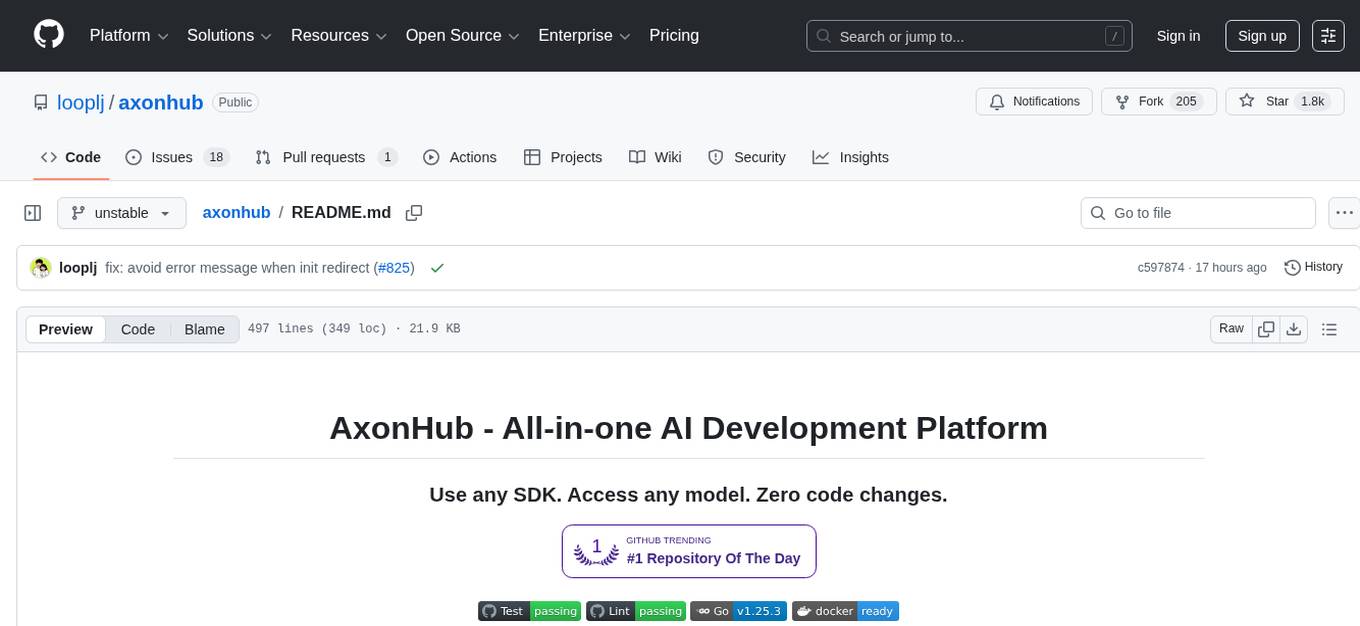
axonhub
AxonHub is an all-in-one AI development platform that serves as an AI gateway allowing users to switch between model providers without changing any code. It provides features like vendor lock-in prevention, integration simplification, observability enhancement, and cost control. Users can access any model using any SDK with zero code changes. The platform offers full request tracing, enterprise RBAC, smart load balancing, and real-time cost tracking. AxonHub supports multiple databases, provides a unified API gateway, and offers flexible model management and API key creation for authentication. It also integrates with various AI coding tools and SDKs for seamless usage.
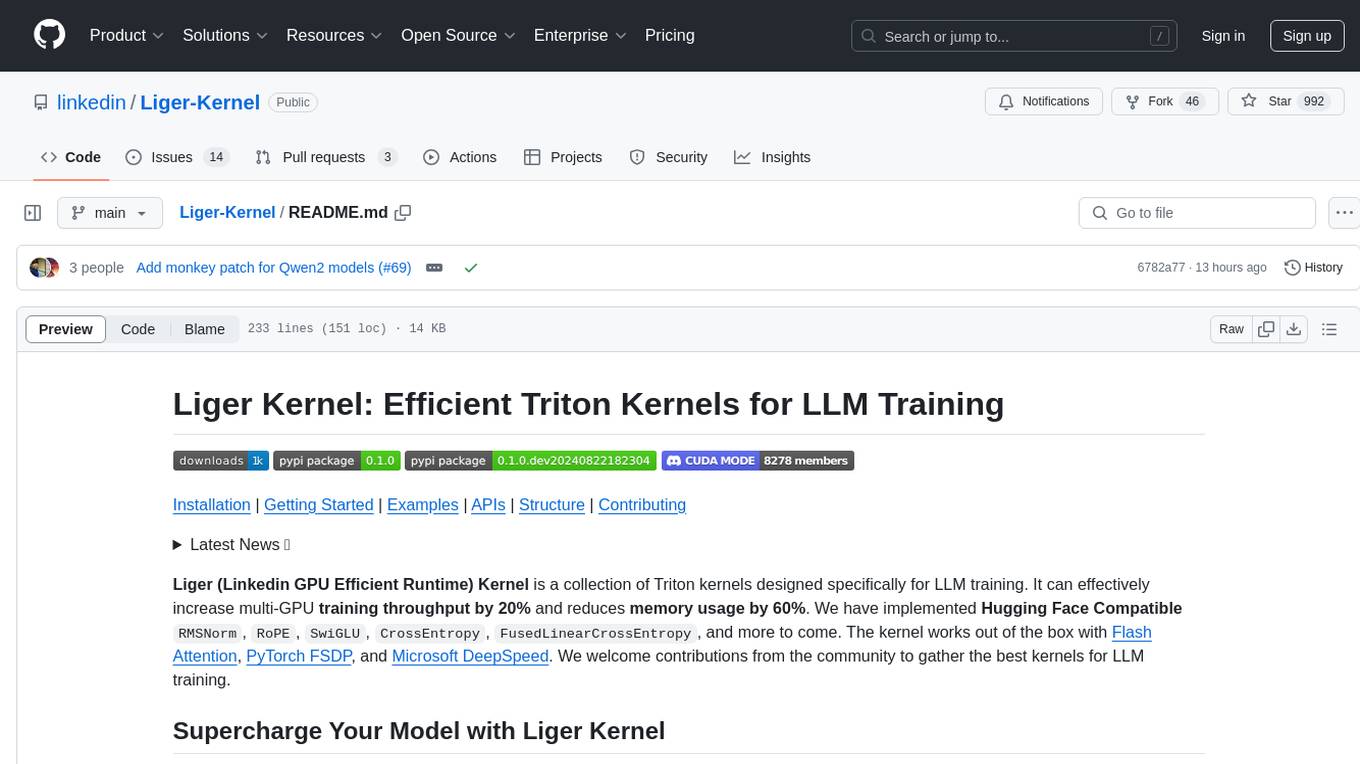
Liger-Kernel
Liger Kernel is a collection of Triton kernels designed for LLM training, increasing training throughput by 20% and reducing memory usage by 60%. It includes Hugging Face Compatible modules like RMSNorm, RoPE, SwiGLU, CrossEntropy, and FusedLinearCrossEntropy. The tool works with Flash Attention, PyTorch FSDP, and Microsoft DeepSpeed, aiming to enhance model efficiency and performance for researchers, ML practitioners, and curious novices.
For similar tasks

ai-on-gke
This repository contains assets related to AI/ML workloads on Google Kubernetes Engine (GKE). Run optimized AI/ML workloads with Google Kubernetes Engine (GKE) platform orchestration capabilities. A robust AI/ML platform considers the following layers: Infrastructure orchestration that support GPUs and TPUs for training and serving workloads at scale Flexible integration with distributed computing and data processing frameworks Support for multiple teams on the same infrastructure to maximize utilization of resources

ray
Ray is a unified framework for scaling AI and Python applications. It consists of a core distributed runtime and a set of AI libraries for simplifying ML compute, including Data, Train, Tune, RLlib, and Serve. Ray runs on any machine, cluster, cloud provider, and Kubernetes, and features a growing ecosystem of community integrations. With Ray, you can seamlessly scale the same code from a laptop to a cluster, making it easy to meet the compute-intensive demands of modern ML workloads.

labelbox-python
Labelbox is a data-centric AI platform for enterprises to develop, optimize, and use AI to solve problems and power new products and services. Enterprises use Labelbox to curate data, generate high-quality human feedback data for computer vision and LLMs, evaluate model performance, and automate tasks by combining AI and human-centric workflows. The academic & research community uses Labelbox for cutting-edge AI research.

djl
Deep Java Library (DJL) is an open-source, high-level, engine-agnostic Java framework for deep learning. It is designed to be easy to get started with and simple to use for Java developers. DJL provides a native Java development experience and allows users to integrate machine learning and deep learning models with their Java applications. The framework is deep learning engine agnostic, enabling users to switch engines at any point for optimal performance. DJL's ergonomic API interface guides users with best practices to accomplish deep learning tasks, such as running inference and training neural networks.

mlflow
MLflow is a platform to streamline machine learning development, including tracking experiments, packaging code into reproducible runs, and sharing and deploying models. MLflow offers a set of lightweight APIs that can be used with any existing machine learning application or library (TensorFlow, PyTorch, XGBoost, etc), wherever you currently run ML code (e.g. in notebooks, standalone applications or the cloud). MLflow's current components are:
* `MLflow Tracking

tt-metal
TT-NN is a python & C++ Neural Network OP library. It provides a low-level programming model, TT-Metalium, enabling kernel development for Tenstorrent hardware.

burn
Burn is a new comprehensive dynamic Deep Learning Framework built using Rust with extreme flexibility, compute efficiency and portability as its primary goals.

awsome-distributed-training
This repository contains reference architectures and test cases for distributed model training with Amazon SageMaker Hyperpod, AWS ParallelCluster, AWS Batch, and Amazon EKS. The test cases cover different types and sizes of models as well as different frameworks and parallel optimizations (Pytorch DDP/FSDP, MegatronLM, NemoMegatron...).
For similar jobs
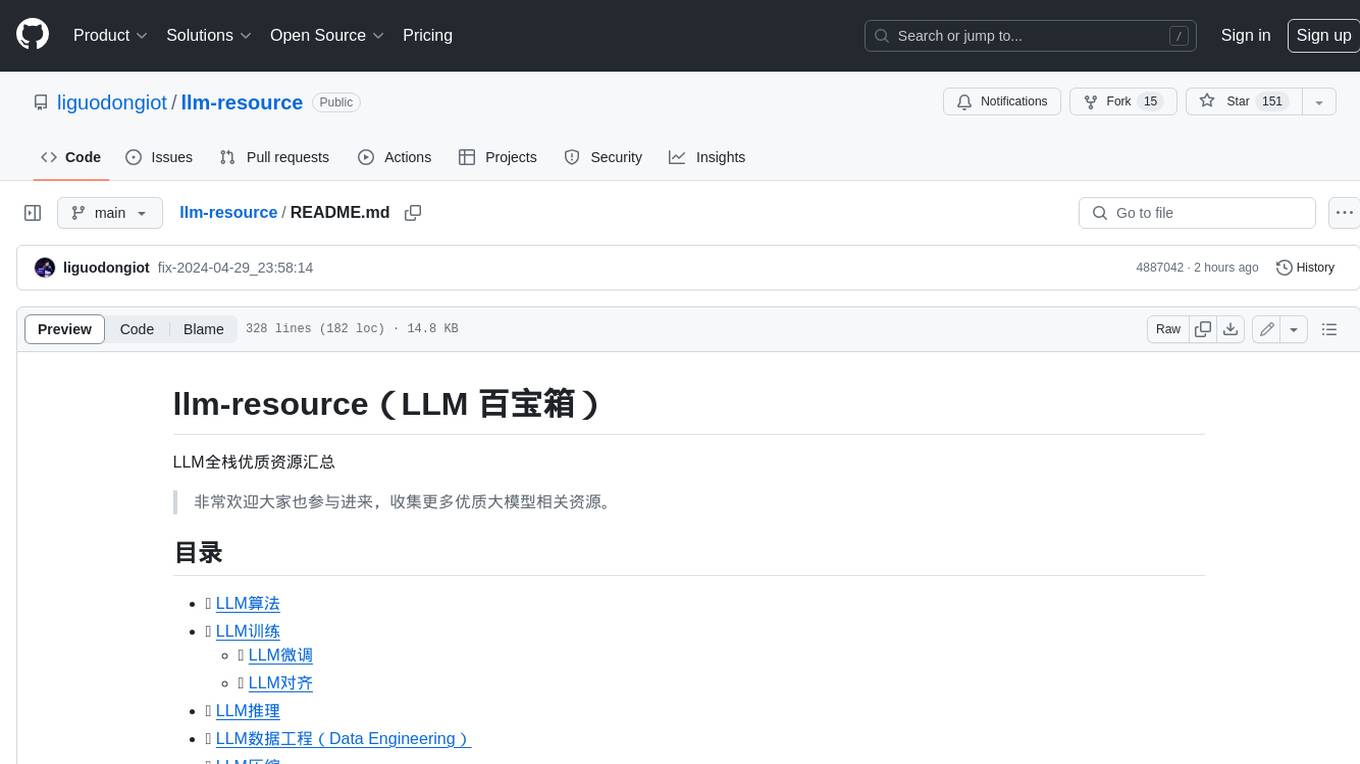
llm-resource
llm-resource is a comprehensive collection of high-quality resources for Large Language Models (LLM). It covers various aspects of LLM including algorithms, training, fine-tuning, alignment, inference, data engineering, compression, evaluation, prompt engineering, AI frameworks, AI basics, AI infrastructure, AI compilers, LLM application development, LLM operations, AI systems, and practical implementations. The repository aims to gather and share valuable resources related to LLM for the community to benefit from.

LitServe
LitServe is a high-throughput serving engine designed for deploying AI models at scale. It generates an API endpoint for models, handles batching, streaming, and autoscaling across CPU/GPUs. LitServe is built for enterprise scale with a focus on minimal, hackable code-base without bloat. It supports various model types like LLMs, vision, time-series, and works with frameworks like PyTorch, JAX, Tensorflow, and more. The tool allows users to focus on model performance rather than serving boilerplate, providing full control and flexibility.
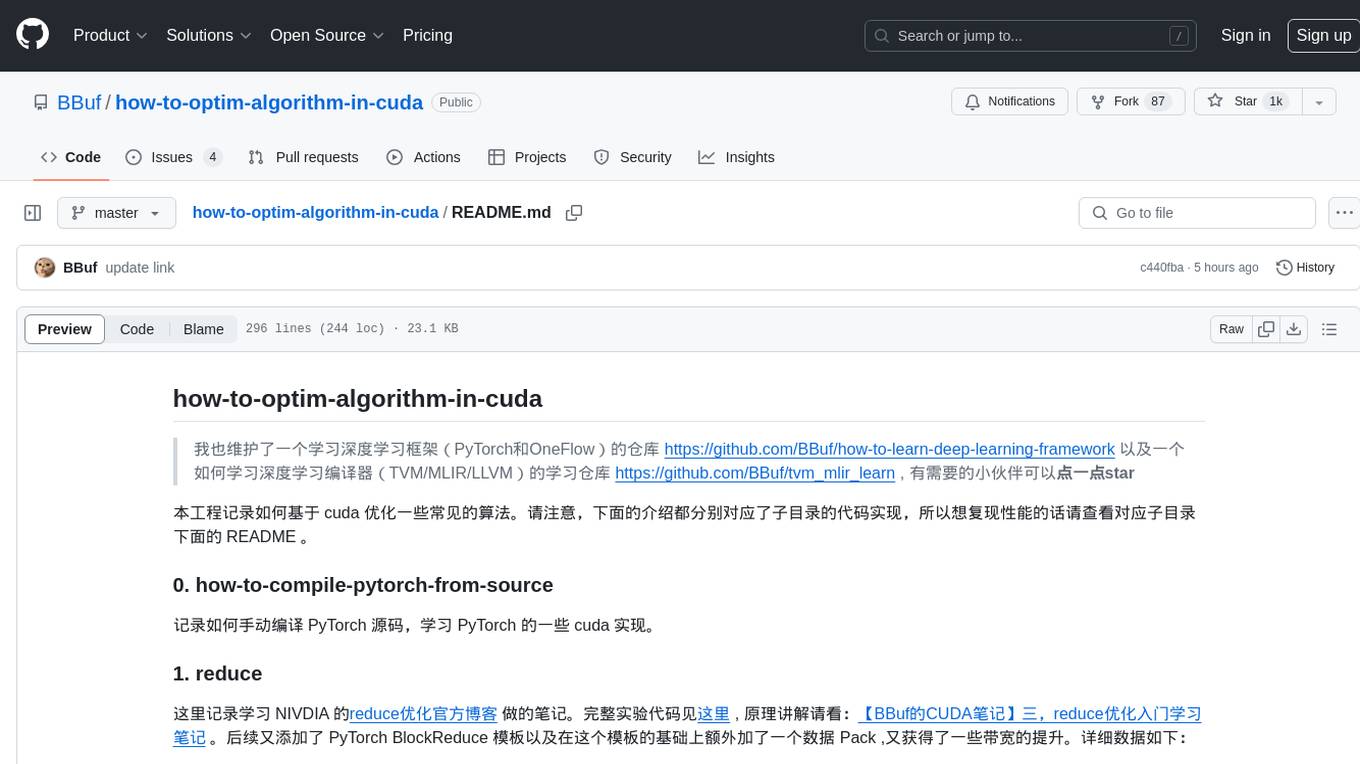
how-to-optim-algorithm-in-cuda
This repository documents how to optimize common algorithms based on CUDA. It includes subdirectories with code implementations for specific optimizations. The optimizations cover topics such as compiling PyTorch from source, NVIDIA's reduce optimization, OneFlow's elementwise template, fast atomic add for half data types, upsample nearest2d optimization in OneFlow, optimized indexing in PyTorch, OneFlow's softmax kernel, linear attention optimization, and more. The repository also includes learning resources related to deep learning frameworks, compilers, and optimization techniques.
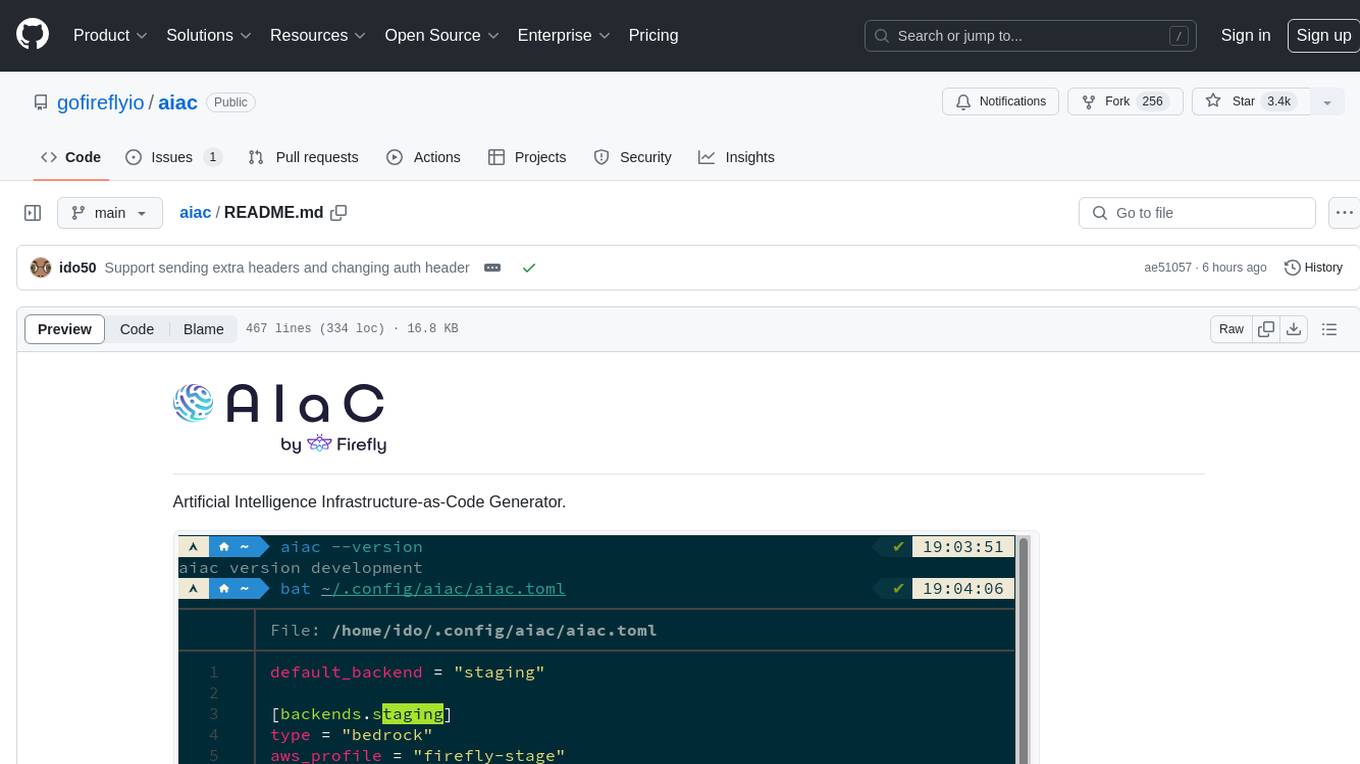
aiac
AIAC is a library and command line tool to generate Infrastructure as Code (IaC) templates, configurations, utilities, queries, and more via LLM providers such as OpenAI, Amazon Bedrock, and Ollama. Users can define multiple 'backends' targeting different LLM providers and environments using a simple configuration file. The tool allows users to ask a model to generate templates for different scenarios and composes an appropriate request to the selected provider, storing the resulting code to a file and/or printing it to standard output.
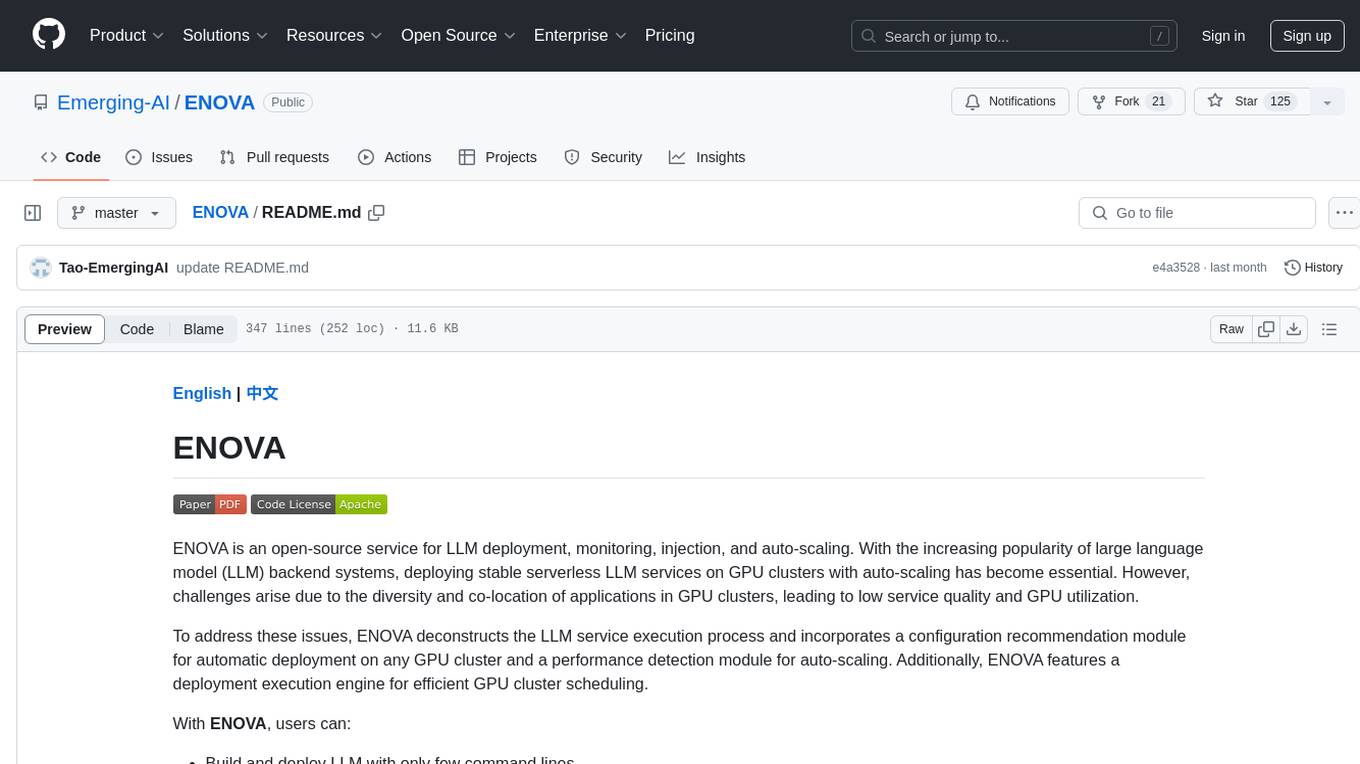
ENOVA
ENOVA is an open-source service for Large Language Model (LLM) deployment, monitoring, injection, and auto-scaling. It addresses challenges in deploying stable serverless LLM services on GPU clusters with auto-scaling by deconstructing the LLM service execution process and providing configuration recommendations and performance detection. Users can build and deploy LLM with few command lines, recommend optimal computing resources, experience LLM performance, observe operating status, achieve load balancing, and more. ENOVA ensures stable operation, cost-effectiveness, efficiency, and strong scalability of LLM services.
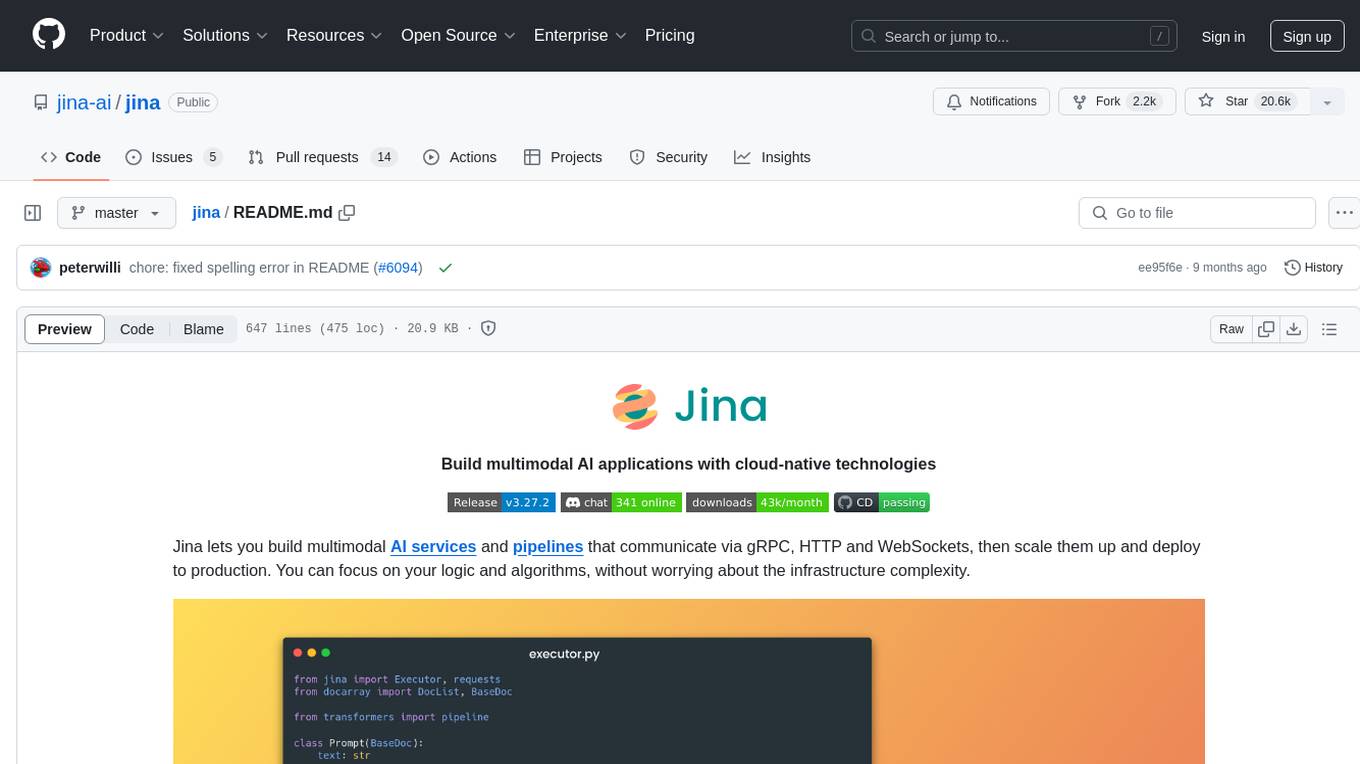
jina
Jina is a tool that allows users to build multimodal AI services and pipelines using cloud-native technologies. It provides a Pythonic experience for serving ML models and transitioning from local deployment to advanced orchestration frameworks like Docker-Compose, Kubernetes, or Jina AI Cloud. Users can build and serve models for any data type and deep learning framework, design high-performance services with easy scaling, serve LLM models while streaming their output, integrate with Docker containers via Executor Hub, and host on CPU/GPU using Jina AI Cloud. Jina also offers advanced orchestration and scaling capabilities, a smooth transition to the cloud, and easy scalability and concurrency features for applications. Users can deploy to their own cloud or system with Kubernetes and Docker Compose integration, and even deploy to JCloud for autoscaling and monitoring.
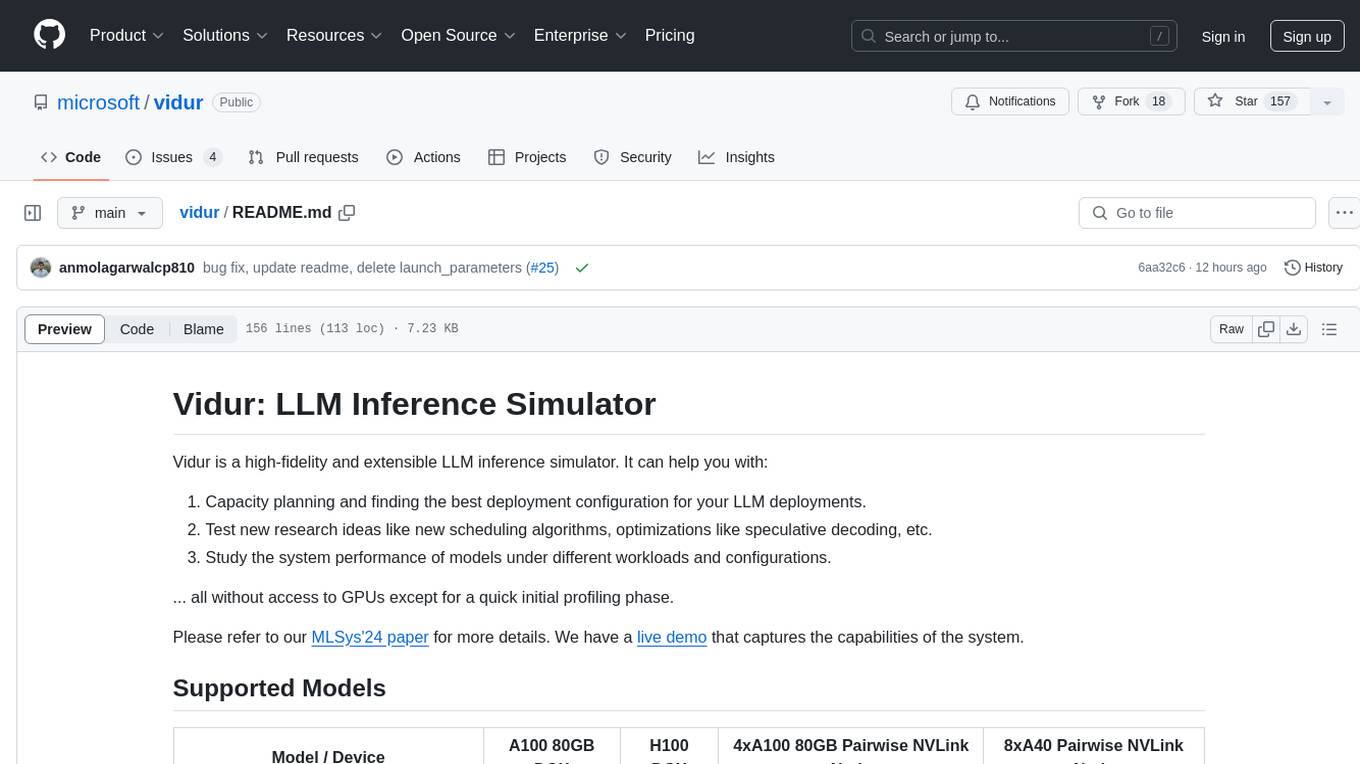
vidur
Vidur is a high-fidelity and extensible LLM inference simulator designed for capacity planning, deployment configuration optimization, testing new research ideas, and studying system performance of models under different workloads and configurations. It supports various models and devices, offers chrome trace exports, and can be set up using mamba, venv, or conda. Users can run the simulator with various parameters and monitor metrics using wandb. Contributions are welcome, subject to a Contributor License Agreement and adherence to the Microsoft Open Source Code of Conduct.
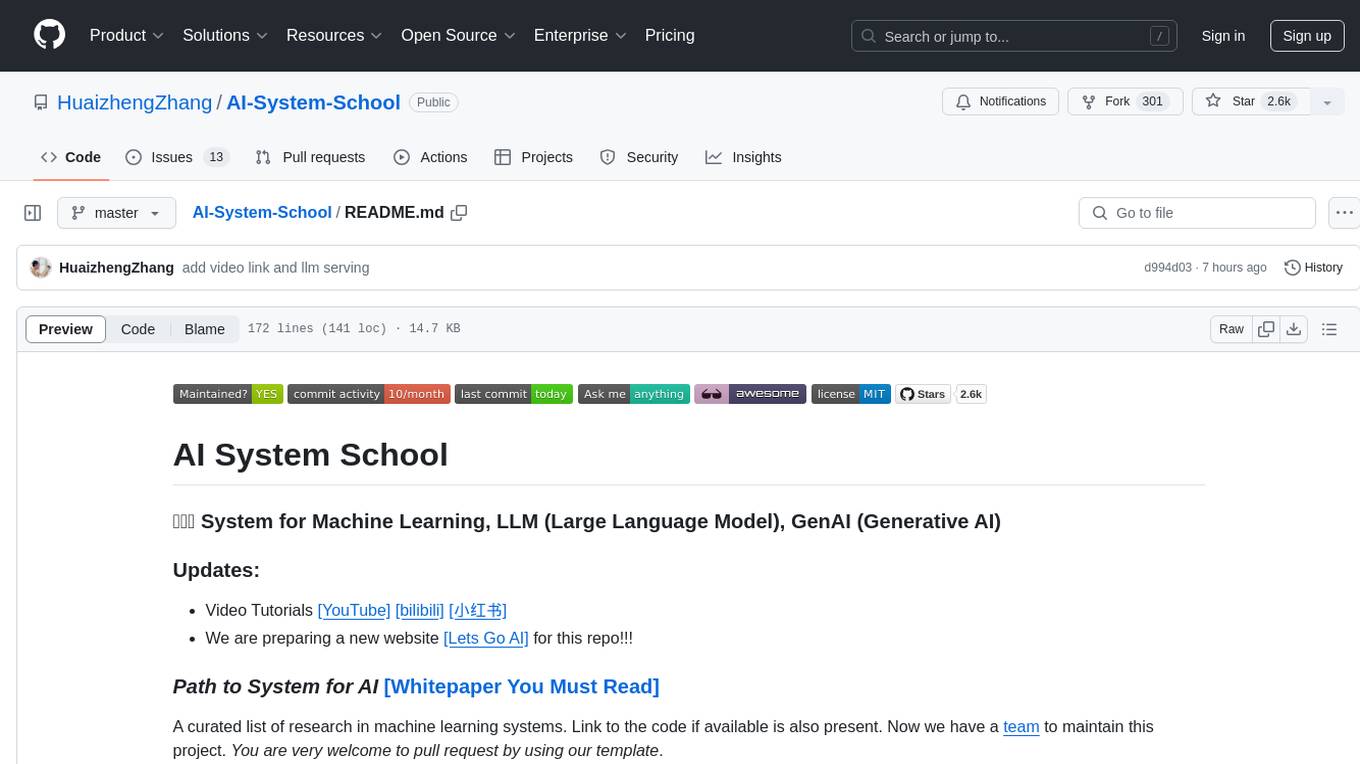
AI-System-School
AI System School is a curated list of research in machine learning systems, focusing on ML/DL infra, LLM infra, domain-specific infra, ML/LLM conferences, and general resources. It provides resources such as data processing, training systems, video systems, autoML systems, and more. The repository aims to help users navigate the landscape of AI systems and machine learning infrastructure, offering insights into conferences, surveys, books, videos, courses, and blogs related to the field.





